Overall, more Americans now identify as politically liberal than did so when the Religious Landscape Study was first conducted, while fewer U.S. adults identify themselves as political moderates. Religious “nones” are more likely than those in many Christian traditions to describe themselves as politically liberal; indeed, 39% of religious “nones” now describe themselves as liberals. However, people who do have a religious affiliation also have grown slightly more likely to identify as politically liberal, from 17% in the 2007 Religious Landscape Study to 20% in 2014.
Though the public has grown slightly more liberal in terms of self-described political ideology, it became slightly less Democratic and a bit more Republican between 2007 and 2014. Evangelical Protestants, who traditionally tend to identify as Republicans, are even more strongly supportive of the GOP now than when the Religious Landscape Study was first conducted. And like the GOP more broadly, evangelicals and members of other heavily Republican religious groups (such as Mormons) are more likely to take both fiscally and socially conservative positions, such as support for smaller government and opposition to same-sex marriage. They also tend to believe abortion should be illegal in most or all cases and are skeptical about human evolution through natural selection.
Meanwhile, traditionally Democratic groups, including members of historically black Protestant churches, religious “nones” and members of some non-Christian religious traditions, continue to identify with the Democratic Party in large numbers.
This chapter describes the attitudes and values of U.S. religious groups on a variety of key social and political topics, and documents how these views have changed since the first Religious Landscape Study was conducted in 2007. On some issues, such as rising support for same-sex marriage and smaller government, there has been dramatic change in recent years. But on other topics, including abortion, the views of Americans overall have held mostly steady.
Political Party and Ideology
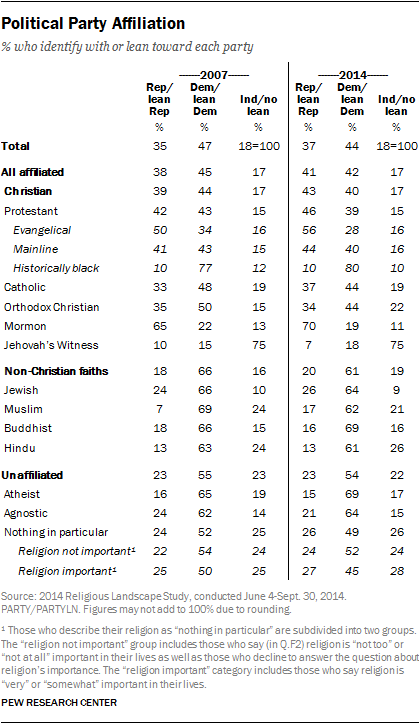
In the 2014 Religious Landscape Study, conducted in mid-2014, 37% of those surveyed say they identify with or lean toward the Republican Party. More than four-in-ten (44%) identify with or lean toward the Democratic Party. And nearly one-in-five respondents (18%) identify as politically independent or with a party other than the GOP or the Democratic Party (and indicate that they do not lean toward either major party).12
There are sharp differences in political party preferences across religious groups. Most evangelical Protestants (56%) and Mormons (70%) identify with or lean toward the Republican Party.
Mainline Protestants and Catholics are more divided. Among mainline Protestants, for example, 44% support the GOP and 40% favor the Democratic Party. Among Catholics, 44% identify with or lean toward the Democratic Party, while 37% favor the Republican Party.
Fully eight-in-ten members of historically black Protestant churches are Democrats or lean toward the Democratic Party, while roughly six-in-ten or more members of non-Christian faiths do the same, including 64% of Jews and 62% of Muslims. A slim majority of religious “nones” (54%) identify with or lean toward the Democratic Party, including 69% of self-identified atheists and 64% of agnostics.
Jehovah’s Witnesses, who generally eschew politics, are distinctive in that three-quarters are strictly independent, neither identifying with nor leaning toward either party.
Overall, the Democratic Party garners somewhat less support, relative to the GOP, than it did in 2007. At the time of the first Religious Landscape Study, the share of Democratic partisans and leaners exceeded the GOP share by 12 percentage points. By the time of the 2014 study, the margin had slipped to 7 points. This pro-GOP trend is seen across a variety of religious traditions but is particularly pronounced among members of several groups who were already strongly supportive of the Republican Party, including evangelical Protestants and Mormons.
When asked to describe their political views, more than a third of respondents say they are very conservative (8%) or conservative (28%), a third say they are moderate (33%) and about a quarter describe themselves as very liberal (7%) or liberal (17%). Since the 2007 Religious Landscape Study, there has been a slight decrease in the share of Americans identifying as moderate (from 36% in 2007 to 33% in 2014) and an increase in the share identifying as liberal or very liberal (from 20% in 2007 to 24% in 2014). The percentage identifying as conservative or very conservative has held relatively steady (37% in 2007, 36% in 2014).
Most evangelical Protestants (55%) and Mormons (61%) identify as conservative. By contrast, most atheists (56%) say they are politically liberal. Other religious groups are more divided across the ideological spectrum.
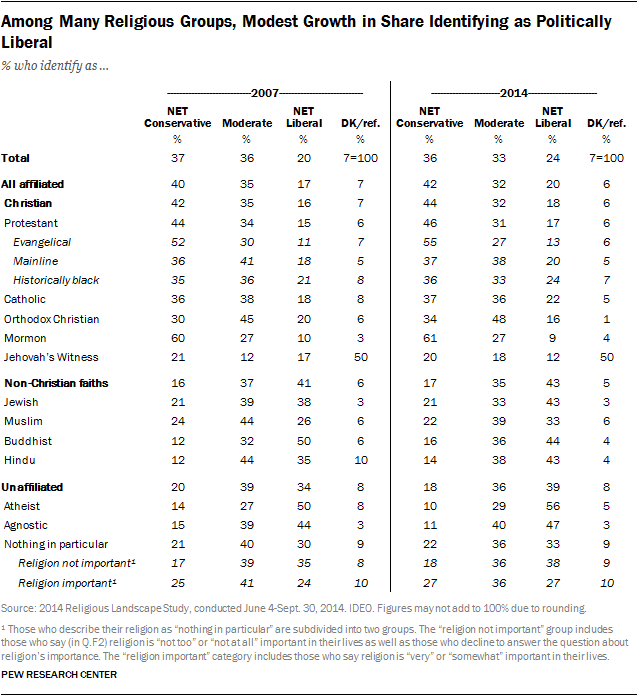
Voter Registration Status

Most Americans (69%) say they are absolutely certain they are registered to vote, while about one-in-five (19%) say they are not registered or do not know if they are registered. Smaller shares of the public say they are probably registered to vote but are uncertain (5%), or are unable to register because they are not U.S. citizens (7%).
Aside from Jehovah’s Witnesses, who typically abstain from voting, majorities of all other major Christian groups are absolutely certain they are registered to vote. Most Jews (79%) and Buddhists (69%) say the same.
Smaller shares of U.S. Muslims (47%) and Hindus (32%) are absolutely certain they are registered to vote, in part because these groups have many members who are not U.S. citizens.
Although a majority of religious “nones” are absolutely certain they are registered to vote, the share saying they are not registered is higher among the unaffiliated (25%) than among affiliated Americans (17%).
Role of Government
As of 2014, more Americans say they would prefer a smaller government providing fewer services (51%) to a bigger government offering more services (42%).
Support for smaller government has grown in recent years. In 2007, respondents were slightly more likely to favor a bigger government (46%) than a smaller government (43%).
Support for small government has increased by 17 percentage points among Republicans and those who lean toward the Republican Party (from 61% in 2007 to 78% in 2014), while there has been relatively little change in support for small government among Democrats (31% vs. 32%).13 Among religious groups, support for smaller government has grown particularly rapidly among two traditionally Republican groups – evangelical Protestants and Mormons. Orthodox Christians also express much more support for limited government now as compared with 2007.

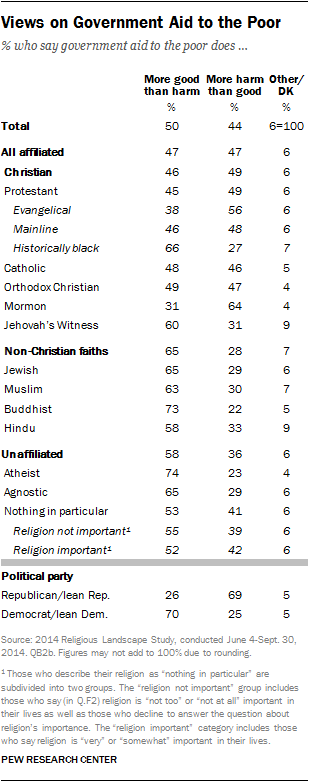
Another issue that divides the public is the role of the government in helping the poor. Half of U.S. adults believe government aid does more good than harm because people can’t get out of poverty until their basic needs are met, while 44% say government aid to the poor does more harm than good by making people too dependent on government assistance.14 This question was not asked as part of the 2007 Religious Landscape Study.
Like views on size of government, the public divide on government aid also is closely tied to political party affiliation. About seven-in-ten Americans who identify as or lean Republican (69%) say government aid to the poor does more harm than good. A similar share of Democrats (70%) believe the opposite: They say such aid does more good than harm.
Religious groups that tend to favor the Republican Party express the most support for the idea that government aid to the poor does more harm than good. More than six-in-ten Mormons (64%) express this view, as do 56% of evangelical Protestants. By contrast, two-thirds of those in the historically black Protestant tradition (66%) say government aid to the poor does more good than harm, as do 65% of Jews and 58% of the religiously unaffiliated. Mainline Protestants and Catholics are closely divided on this issue.
Views on Environmental Regulations

A majority of Americans (57%) say stricter environmental laws and regulations are worth the cost, while 38% say such laws cost too many jobs and hurt the economy.
Support for environmental regulation is down modestly since 2007, when roughly six-in-ten U.S. adults (61%) and majorities across most major religious groups said stricter laws were worth the cost.
More specifically, there has been a sharp decrease in support for stricter environmental laws among Republicans and those who lean toward the GOP (13 percentage points), and a slight increase in support among Democrats (3 points) since 2007. Support for stricter environmental laws remains high among some heavily Democratic religious groups, such as atheists (79%), while it has declined considerably among Mormons (from 55% in 2007 to 42% in 2014) and evangelical Protestants (54% vs. 45%).
Homosexuality and Same-Sex Marriage
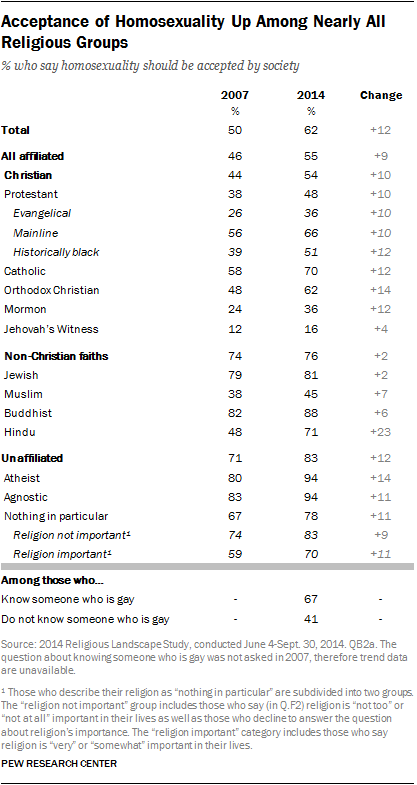
Most Americans (62%) say homosexuality should be accepted by society, while only half as many (31%) say homosexuality should be discouraged. Acceptance of homosexuality is up by 12 points nationally since 2007, and has increased significantly among nearly every major religious group during that time.
Seven-in-ten Catholics and two-thirds of mainline Protestants now say homosexuality should be accepted by society. By contrast, 36% of both evangelical Protestants and Mormons say the same, although both groups are substantially more accepting of homosexuality today than they were in 2007.
Large majorities of Jews (81%), Buddhists (88%), Hindus (71%) and religious “nones” (83%) say homosexuality should be accepted by society.
The belief that homosexuality should be accepted by society also is tied to knowing someone who is gay. Among respondents who report knowing someone who is gay or lesbian, fully two-thirds say homosexuality should be accepted by society, while roughly four-in-ten of those who do not know someone who is gay say the same. About four-in-five Americans (81%) say they know someone who is gay or lesbian, including majorities across most major religious groups.
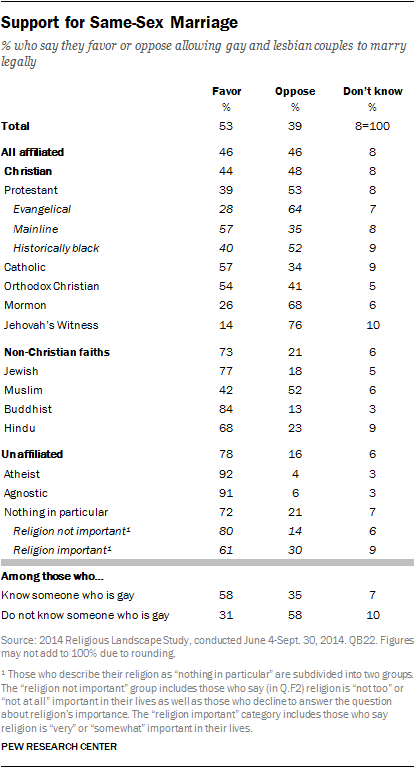
Slightly more than half of respondents in the 2014 Religious Landscape Study (53%) said they favor allowing gay and lesbian couples to marry legally. Although the 2007 Landscape Study did not ask about same-sex marriage, other surveys have found that support for same-sex marriage has increased dramatically in recent years. And the most recent Pew Research polling on this question, conducted in July 2015, found that 54% of U.S. adults now say same-sex marriage should be legally permitted.
The 2014 Religious Landscape Study finds that most members of non-Christian faiths and religious “nones” are in favor of same-sex marriage. This includes two-thirds or more of Buddhists, Jews and Hindus as well as more than three-quarters of the unaffiliated. About nine-in-ten atheists (92%) and agnostics (91%) support same-sex marriage, as do eight-in-ten of those whose religion is “nothing in particular” and who say religion is not important to them.
Among Christians, most Catholics (57%), mainline Protestants (57%) and Orthodox Christians (54%) favor same-sex marriage. There is far less support for same-sex marriage among evangelical Protestants (28%), Mormons (26%) and Jehovah’s Witnesses (14%). There is, however, a strong generational divide in views about same-sex marriage across religious traditions, including among evangelicals; young adults in the evangelical Protestant tradition are far more supportive of same-sex marriage than are older evangelicals. These differences by generation mirror those seen among the public as a whole.
Among Americans who know someone who is gay, most (58%) say they support same-sex marriage. However, among those who do not know someone who is gay, the share saying they favor same-sex marriage drops to about three-in-ten (31%).
Views on Abortion
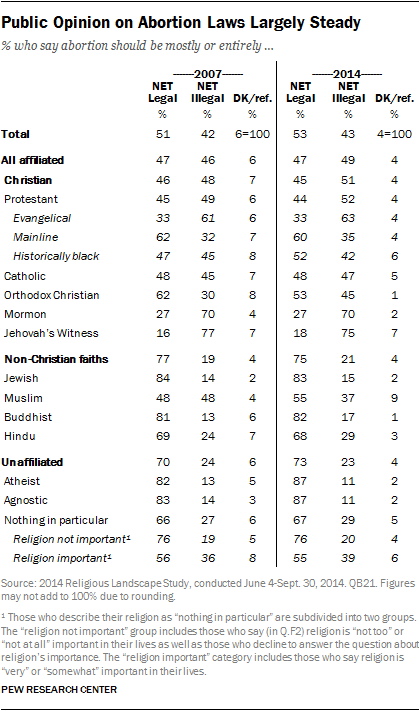
Slightly more than half of U.S. adults say abortion should be legal in all (20%) or most (33%) cases, while fewer say it should be illegal in all (16%) or most (27%) cases. Views on abortion laws have remained relatively stable in recent years among the general public as a whole and across many major religious groups.
Opinions on this issue continue to vary widely by religious tradition. Clear majorities of mainline Protestants (60%) and most major non-Christian groups express support for legal abortion, as do nearly three-quarters of people with no religious affiliation (73%). Far fewer evangelical Protestants (33%), Mormons (27%) and Jehovah’s Witnesses (18%) believe abortion should be legal in most or all cases. Roughly half of Catholics (48%) and members of historically black Protestant churches (52%) say abortion should be legal in all or most cases.
Women in the Workforce
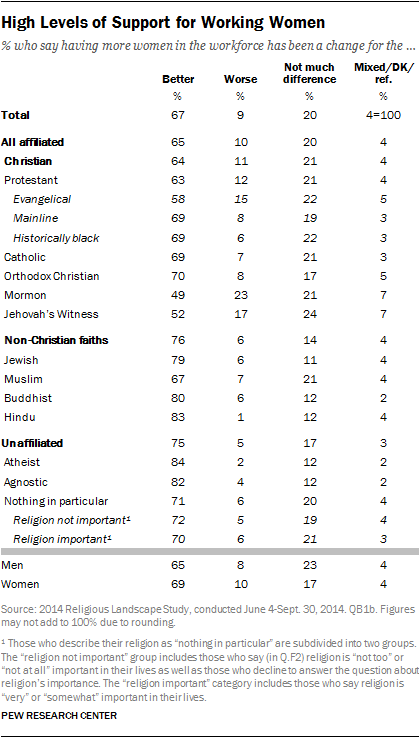
Two-thirds of Americans say having more women in the workforce over the last 50 years has been a change for the better, compared with just 9% who say it has been a change for the worse. One-in-five U.S. adults say it hasn’t made much of a difference. This question was not asked as part of the 2007 Religious Landscape Study.
Large majorities of most major religious groups are in agreement that having more women in the workforce has been a change for the better. Two exceptions are Mormons and Jehovah’s Witnesses, among whom about half share this view. Still, members of these groups are considerably more likely to say that having more working women has been a positive rather than negative change.
Women are only modestly more likely than men to say having more women in the workforce has been a change for the better (69% vs. 65%).
Views on Childbearing
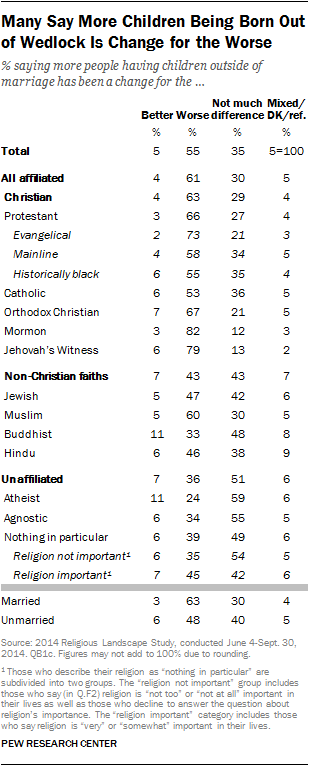
More than half of Americans (55%) say more people having children without getting married has been a change for the worse, while few (5%) say it has been a change for the better. Roughly a third (35%) say it has not made much difference for society. This question was not asked as part of the 2007 Religious Landscape Study.
Majorities of all major Christian traditions say the trend toward childbearing outside marriage has been a change for the worse. This view is most common among Mormons (82%), Jehovah’s Witnesses (79%) and evangelical Protestants (73%). Smaller majorities of mainline Protestants (58%) and about half of those in the historically black Protestant tradition (55%) and Catholics (53%) say this has been a negative trend.
By contrast, religious “nones” are less likely to see the increase in childbearing outside marriage as a change for the worse. Roughly half of religiously unaffiliated people (51%) say this trend does not make much difference.
While most married respondents say people having children outside of marriage is a change for the worse (63%), people who are not married are more divided on whether this is a change for the worse (48%) or has not made much difference (40%).
Immigration
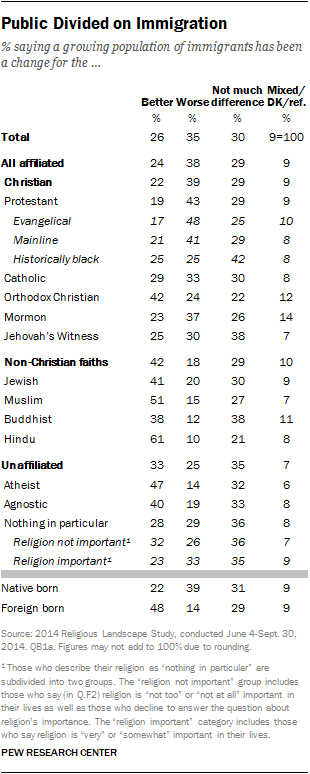
Americans’ views about the growing number of immigrants in the population are mixed. In the 2014 Religious Landscape Study, about a quarter (26%) say this trend has been a change for the better, 35% say it has been a change for the worse and 30% say it has not made much difference. This question was not asked as part of the 2007 Religious Landscape Study.
There is substantial disagreement among Christian groups on this question. About half of evangelical Protestants (48%) say the growing number of immigrants has been a change for the worse, while just 17% view it as a change for the better. By contrast, only about a quarter of members of the historically black Protestant tradition (25%) and Orthodox Christians (24%) say having more immigrants in the population has been a change for the worse.
About half of U.S. Muslims (51%) and 61% of Hindus say more immigrants is a change for the better; majorities of both groups are immigrants themselves.
Among the unaffiliated, 47% of atheists say the growing immigrant population has been a change for the better, as do 40% of agnostics. Fewer say this among those who describe their religion as “nothing in particular.”
Younger adults (ages 18 to 49) are more likely than Americans ages 50 and older to say recent immigration has been a positive societal change. And Hispanics are more likely than non-Hispanic whites to say increased immigration has been a positive change. A plurality of Hispanic Catholics, for example, say the nation’s growing population of immigrants has been a change for the better (45%). Among white Catholics, by contrast, a plurality (44%) express the view that growing numbers of immigrants has been a change for the worse.
Evolution
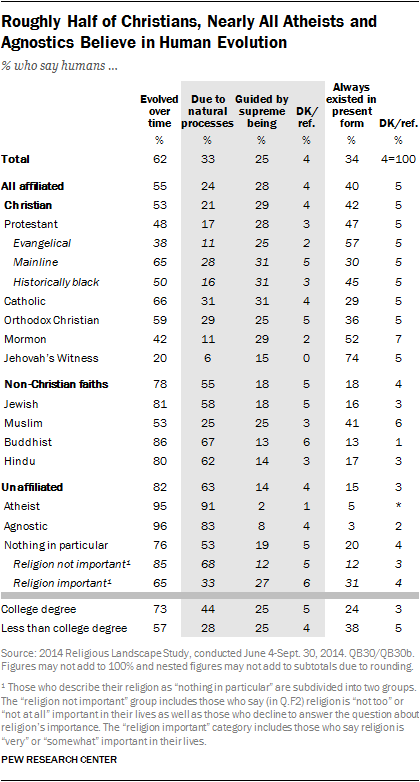
Roughly six-in-ten respondents in the 2014 Religious Landscape Study (62%) say humans have evolved over time, while about a third (34%) say humans have always existed in their present form, similar to other recent Pew Research surveys. This question was not asked as part of the 2007 Religious Landscape Study.
Among those who believe that humans evolved, there is disagreement over whether this evolution has been due to natural processes or guided by a supreme being. A third of U.S. adults believe evolution has occurred due to natural processes, while a quarter say a supreme being guided evolution.
About two-thirds of Catholics (66%) and mainline Protestants (65%) believe humans evolved over time. By contrast, most Jehovah’s Witnesses (74%) and evangelical Protestants (57%) and about half of Mormons (52%) reject this view, saying human beings have always existed in their present form.
Atheists (95%) and agnostics (96%) in the survey nearly universally say humans evolved over time, and most believe that evolution has occurred through natural processes. Majorities of Buddhists, Hindus and Jews also hold this view.
Overall, respondents with a college degree are more likely than those with less education to say humans evolved over time due to natural selection. However, the impact of education varies across religious groups. Members of mainline and historically black Protestant churches, Catholics and religious “nones” with a college degree all are more likely than their less well-educated counterparts to say humans evolved over time. But evangelical Protestants with a college degree are no more likely than those without a college degree to say humans have evolved.




